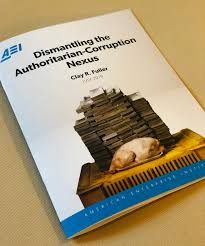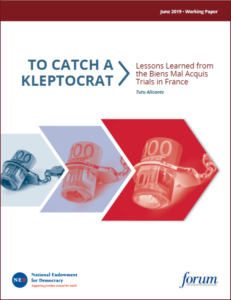 The effects of authoritarianism are amplified and obfuscated by growing economic interconnectivity. Combating authoritarianism and addressing the dark networks that support its consolidation are the unavoidable strategic challenges to global security, notes AEI analyst Clay R. Fuller:
The effects of authoritarianism are amplified and obfuscated by growing economic interconnectivity. Combating authoritarianism and addressing the dark networks that support its consolidation are the unavoidable strategic challenges to global security, notes AEI analyst Clay R. Fuller:
The authoritarian-corruption nexus is the growing convergence of licit and illicit state and non-state actors that facilitates and launders the profits of illegal activity, reinforcing the strength and survival of authoritarian systems of governance everywhere. It depends on and resides in the complex and rapidly changing global economic currents flowing in and out of American markets and is the defining threat to freedom in the 21st century.
With a clearer understanding of the personalistic and kleptocratic foundations of modern authoritarianism, our understanding of the authoritarian-corruption nexus begins to take shape, he writes in a new report. The solutions to dismantling the authoritarian-corruption nexus reside in democratic capitalism and must be pursued at the domestic and international levels to succeed, he adds:
- Domestic efforts should include addressing the (ab)use of anonymous shell corporations, federalizing the Treasury’s Financial Crimes Enforcement Network, lifting the Patriot Act’s exemption on real estate, upgrading US foreign trade zones, reevaluating the Foreign Agents Registration Act, and giving the private sector a greater role in anti-corruption efforts.
- On the international stage, the US should seek to reestablish the Group of Seven as a formal institution for developed democracies and revise the processes of the Financial Action Task
Force to fight trade-based money laundering.
 A recent discussion of the report with the author featured Bruce Bueno de Mesquita from New York University and Daniel Twining of the International Republican Institute, a partner of the National Endowment for Democracy, AEI adds:
A recent discussion of the report with the author featured Bruce Bueno de Mesquita from New York University and Daniel Twining of the International Republican Institute, a partner of the National Endowment for Democracy, AEI adds:
Dr. Bueno de Mesquita discussed the role that democratic citizens play in promoting authoritarian corruption. He argued that citizens frequently demand their leaders seek favorable policy concessions from authoritarian leaders, which occurs through bribery in the form of foreign aid. Meanwhile, Dr. Twining pointed to the important leadership role the US plays in supporting more accountable and transparent institutions within the world’s most corrupt authoritarian regimes. He argued that citizens in authoritarian states share fundamental desires for freedom and good governance with citizens in democracies. RTWT
Yet the connection between authoritarianism and kleptocracy is not simple, and invites additional scrutiny, says the International Forum for Democratic Studies. It recently asked five leading experts about the relationship between authoritarianism and kleptocracy:
Stable and secure democratic institutions are widely believed to curb kleptocratic practices, as they inherently protect fundamental measures of accountability such as judicial independence, a free press, and a vibrant civil society. While some young or struggling democracies, such as Brazil, exhibit kleptocratic tendencies, the worst kleptocracies in the world—such as Angola, Azerbaijan, Russia, and Equatorial Guinea—fall squarely in the authoritarian category.







